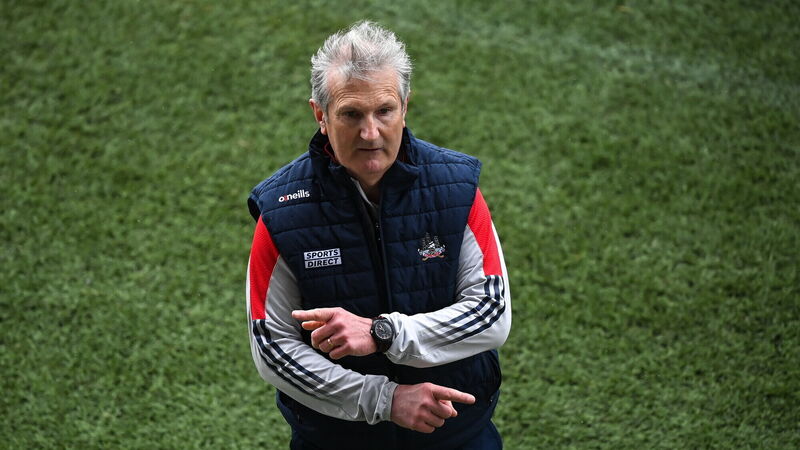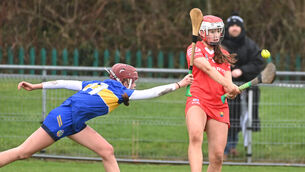Cork hurlers had lots of time to fix the problems of 2021 but didn’t do it

Cork manager Kieran Kingston during the Munster GAA Hurling Senior Championship Round 1 match between Cork and Limerick at Páirc Uí Chaoimh in Cork. Photo by Stephen McCarthy/Sportsfile
LOOKING at Cork’s over-elaborate style of play you can’t help thinking that the Cork hurling management team have spent too much time watching the likes of Manchester City and Barcelona and reading up on the coaching culture of Pep Guardiola and have convinced themselves that they can bring a similar approach to hurling.
Ultimately, hurling is far more physical than soccer and the same principles of retaining possession at all costs cannot be applied. Cork’s possession and running game is much too rigid and far too easy to analyse for good coaches likes John Kiely and Liam Cahill to dismantle, so if Cork persist with it then it will probably be the cross they die on.
We do not get to see Cork’s training sessions, but we can imagine that the Cork players probably run wonderful lines and execute fantastic moves that get everyone excited about how well they are preparing, but it is all well and good running these pretty patterns in training, it is a very different thing to do it when you are faced with a side who have put particular time and effort into analysing your approach and who go out of their way to put up roadblocks to scupper you.
The Cork management obviously feel their approach is a progressive one, but in reality it is too easy to defend against.
Key individuals can be marginalised and opposition sides know that Cork will not hit the ball long so they can compress the middle eight in the knowledge that at some stage they can force a Cork player into contact.
With that knowledge in the bag the opposition knows that if they are aggressive enough that turnovers are inevitable and this further fuels the feeding frenzy that invariably ensues. Cork coughed up 2-16 from turnovers conceded against Limerick.
That is a startling total.

And it is not just Cork who have this problem. When the game was there to be won last Saturday night in Limerick, Waterford fell into the same trap.
They got the match back to all square but failed to score another point after the 52nd minute due to the fact that they kept bringing the ball into contact in midfield and the gleeful Limerick mob were waiting for them.
The smart ball was to feed the livewire Dessie Hutchinson inside, as he was pretty much unmarkable on the night and constantly on the move, but Waterford fell into Limerick’s trap instead.
No team is going to beat this Limerick side by running through them.
Over them and around them, perhaps, but not through them.
Ironically, if Cork did introduce a style where they were hitting early, diagonal ball into the corners then opposition sides would be forced to downsize the press to the middle eight, as they would have to drop some players deeper, which in turn would create more room and space for Cork to pass their way through.
One of the unintended consequences of Cork’s through the lines approach is that the inside forwards know that there is little chance that a fast early ball will be played into them.
This invariably means that the inside forwards are not going to make the type of runs that they would normally make, which then leads to the kind of situations that occurred for Limerick’s second goal against Cork, where neither Tim O’Mahony or Sean O’Donoghue had an outlet ball, and they ended up coughing up possession, and the softest of goals.
Cork’s approach to pressurising puckouts also requires considerable amendment. Against Limerick the first receiver was, on too many occasions, allowed the time and space to pick out a colleague in the middle third, with that colleague often being in acres of space.
If a team decides to concede the short puckout then there must ultimately be a reason and a strategy behind that.
The receiver must be put under serious pressure as they are gathering possession so that they are not in a position to pick a perfect pass, and in no circumstances should there be an easy out ball 30 or 40 yards in front of him.
This should only occur in the event of a complete systems failure. Against Limerick, the system failed.
The frustration from Cork fans is that management had eight months to iron out these problems, yet to the naked eye very little was done in this regard.
To completely fix what look like complete system failures when you are in the middle of the dogfight that is the round robin Munster Championship minefield is incredibly difficult.
These fixes should have been implemented months ago.







 App?
App?







